Congress

And Pope Francis has shaken up Washington politics.
While done in a subtle manner, the pope’s speech to Congress was forthright and unyielding in reminding each lawmaker of the responsibility they have to “defend and preserve the dignity of your fellow citizens in the tireless and demanding pursuit of the common good…”
His bottom line message for the multiple issues he raised and one Congress seems to have strayed away from in recent years was, “Let us remember the Golden Rule: ‘Do unto others as you would have them do unto you’” (Matthew 7:12). Simple, right? Yet Congress seems to be out of touch with the needs of the American people.
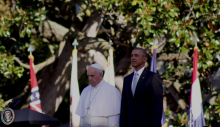
Stunning is the word that most comes to me after Pope Francis’ two-day visit to Washington, D.C. The country and the media was reveling in his presence, using language like “amazing,” “incredible,” and “wonderful” in response to this extraordinary moral leader who literally transformed our public discourse in the 48 hours he was in the nation’s capital. What these two extraordinary days mean going forward is the big question on all our hearts and minds.
At the formal welcoming ceremony on the South Lawn at the White House, a very traditional template was transformed by the “Vicar of Christ,” whose presence turned everyone’s language to one reference after another to those Christ called “the least of these” in the 25th chapter of Matthew. Never have I heard the most vulnerable being the most talked about in this city.
President Obama began the pope’s visit with these words, “What a beautiful day the Lord has made.”
Indeed. Then Pope Francis introduced himself to America as “a son of an immigrant family” who was “happy to be a guest in this country, which was largely built by such families.”
Point made.

At his speech before Congress on Sept. 24, Pope Francis listed Trappist monk Thomas Merton as one of four exemplary Americans who provide wisdom for us today.
Out on the National Mall, thousands cheered when the pope named two other exemplary Americans: Abraham Lincoln and Martin Luther King Jr. Fewer recognized Merton (or the fourth exemplar the pope mentioned, social activist Dorothy Day.)
The pope did not choose to hail anyone associated with the institutional Catholic Church as his models. Instead he chose a former president, a Protestant minister, a lay Catholic, and a monk.

Here are the politics of the Iran nuclear deal: Congress returns next week from its summer recess, and among the first orders of business will be taking up the Joint Comprehensive Plan of Action on Iran's nuclear program, recently negotiated with Iran in Vienna by the five permanent members of the United Nations Security Council plus Germany.

House Republicans began their effort to de-fund Planned Parenthood Sept. 9 with the first in a series of hearings intended to make the case that the group is illegally harvesting and selling tissue from aborted fetuses, a claim the group vehemently denies.
The hearing in the House Judiciary Committee — titled “Examining the Horrific Abortion Practices at the Nation’s Largest Abortion Provider” — is the first of several hearings expected this fall as three House committees pursue investigations of Planned Parenthood. House Republicans also launched a website Wednesday to track their investigations into the group.
Beyond the specific techniques under scrutiny, the hearing became an opportunity to air a broader agenda of reducing abortions generally. Chairman Bob Goodlatte, R-Va., opened the hearing with a call for Congress to pass legislation to bar all abortions after five months of gestation, which would “help ensure that the body parts of late-aborted babies cannot be sold because late-term abortions would be generally prohibited.”

President Obama has secured the votes required to pass the Iran nuclear deal, reports The New York Times.
Senator Barbara Mikulski became the 34th Democrat in favor of the deal one day after Senators Chris Coons of Delaware and Bob Casey of Pennsylvania pledged their support.

t’s also one of the most divisive political issues on the Hill right now. Here’s why: The notion of "fast tracking" trade deals with almost no congressional oversight has led to the creation of odd alliances — putting the Democrats and Tea Party in one camp (against), and the Republicans and Obama Administration (for) in another. Pro-business Republicans are long time supporters of free trade, while members of the Tea Party are against most anything that would allow the President to usurp legislative authority. As for Democrats, they argue that the TPP would allow multinational corporations to undermine labor safeguards, civil rights, environmental protection and healthcare, and derail urgent efforts at fighting climate change. Organizations typically aligned with President Obama are against him here: labor unions, environmental groups, and even traditionally non-political groups have fought hard against Fast Track and the TPP.
Indeed, the potential harm from the trade deal seems to leave few interest groups untouched. To provide just a few examples, Doctors Without Borders has called the TPP the "worst trade deal ever," claiming that it will cause millions to lose access to life-saving medicines; left-leaning Global Exchange has pointed to the increasing number of sweatshops such a framework would lead to; and the digital rights organization Electronic Frontier Foundation has expressed its belief that the TPP would put overly restrictive controls on the internet. And we’ve already seen our political leaders weaken standards for protection against human trafficking and child labor should the trade deal move forward.
These are all compelling arguments, and they are ones faith groups are making as well.

WITH A LONG history of involvement in the evolution of the Social Security program, Nancy Altman and Eric Kingson are the right analysts to explain the program and demonstrate conclusively that, with careful tending by Congress, Social Security will be there for future generations: a critical part of retirement finances for the vast majority of the American people and, for many, the only retirement support. They argue that Congress should be strengthening and expanding Social Security—and they show how this can be done and the bill paid.
The book makes clear that Social Security is not an entitlement program but a social insurance program with premiums paid through payroll taxes. Its $2.8 trillion trust fund represents the full-faith support of the American people to provide essential insurance coverage for all our people against the universal hazards of death, disability, and old age. It compares how our system stacks up against those of other advanced industrial societies. (We are distinctly less generous to our senior citizens than other developed nations.)
1. How Yemen Became the Middle East’s Latest Regional Nightmare
As Saudi Arabia and Egypt say they’re prepared to send in ground troops, here’s a look at how Yemen got to this point.
2. God and Jeb
“[Jeb] Bush wants Christian conservatives to pay attention to what he's done, not just to what he says. But in a Republican presidential primary, can actions — much less actions more than a decade in the past — actually speak louder than words? Can quiet faith, and quiet support from some religious leaders, carry the day against a field full of outspoken Christian warriors?”
3. A Response to Critics of the Open Letter to Franklin Graham
“Jesus says ‘If another member of the church sins against you, go and point out the fault when the two of you are alone.’ Jesus does not say, ‘If another member of the church sins against millions, and hundreds of thousands begin to follow his lead on the issue, go and point out the fault when the two of you are alone.’”
4. Women & Leadership: Public Says Women Are Equally Qualified, but Barriers Exist
And it might not be the barriers you would think. “Only about one-in-five say women’s family responsibilities are a major reason there aren’t more females in top leadership positions in business and politics. Instead, topping the list of reasons, about four-in-ten Americans point to a double standard for women seeking to climb to the highest levels of either politics or business, where they have to do more than their male counterparts to prove themselves. Similar shares say the electorate and corporate America are just not ready to put more women in top leadership positions.”

President Obama will welcome Pope Francis to the White House during the pontiff’s U.S. visit in September to “continue the dialogue … on their shared values and commitments on a wide range of issues,” White House press secretary Josh Earnest said March 26.
The meeting with the president and first lady will take place on Sept. 23, apparently near the start of a visit — the first to the U.S. by the Argentine pope — that will take Francis from the U.S. Capitol to New York and the United Nations and will conclude with a huge outdoor Mass in Philadelphia.
“During the visit, the President and the Pope will continue the dialogue, which they began during the President’s visit to the Vatican in March 2014, on their shared values and commitments on a wide range of issues,” Earnest said in a statement.
Those issues, he said, include “caring for the marginalized and the poor; advancing economic opportunity for all; serving as good stewards of the environment; protecting religious minorities and promoting religious freedom around the world; and welcoming and integrating immigrants and refugees into our communities.”
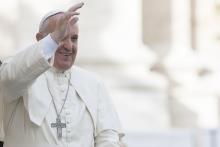
The Francis Revolution is crossing the Atlantic and coming to the heart of the nation’s Capitol. News broke yesterday that Pope Francis has accepted Speaker John Boehner’s invitation to address a rare joint session of Congress during his upcoming trip to the United States on Sept. 24.
This is the first time that a pope has addressed Congress and provides a world-class opportunity for the Holy Father to lift up the Gospel’s social justice message to the most powerful legislative body in the world.
So what will the Jesuit from Argentina talk about? Studying his nearly two-year tenure as the Bishop of Rome suggests that Pope Francis will focus particularly on the scandal of inequality and exclusion.
Last April, Pope Francis tweeted that “inequality is the root of all social evil.” The seven-word tweet caused an uproar in American media, but the truth is that Francis had been saying the same thing for years. In his 2013 letter Joy of the Gospel, Francis wrote “just as the commandment ‘Thou shalt not kill’ sets a clear limit in order to safeguard the value of human life, today we also have to say ‘thou shalt not’ to an economy of exclusion and inequality. Such an economy kills.”
With reports last fall suggesting that economic inequality in the United States is at its highest levels since the Great Depression, Pope Francis will likely call on our elected leaders to transform our economy into one where no one is left behind.
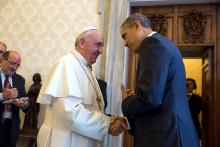
Pope Francis will make an unprecedented address to Congress on Sept. 24 during his first visit to the United States.
House Speaker John Boehner announced Feb. 5 that the pontiff accepted the invitation Boehner extended last year.
“In a time of global upheaval, the Holy Father’s message of compassion and human dignity has moved people of all faiths and backgrounds,” Boehner said in a statement. “His teachings, prayers, and very example bring us back to the blessings of simple things and our obligations to one another.”
No pope or religious leader who serves as a head of state has ever addressed Congress, according to the U.S. House Historian’s Office.
In a brief statement, the Archdiocese of Washington said: “It is a great honor and tremendous joy to welcome our Holy Father, Pope Francis, to the Archdiocese of Washington during his proposed pastoral visit to the United States in September.


Did you catch the shoutout to Pope Francis during President Obama’s State of the Union address? It’s only the third time in history that’s happened.
Francis’ name will resurface in Congress later this year if and when he accepts an invitation to address lawmakers — that would be a historical first — during his September trip to Philadelphia, Washington, and New York.
“We might say, really, the highlight of the Washington visit might be his speech to the joint meeting of Congress, to the Senate and the House of Representatives,” said Archbishop Bernardito Auza, a member of the papal visit planning committee.
However, such a speech will be far more than a “highlight.” With a Catholic vice president and a Catholic speaker of the House looking on behind him, the speech will serve as a vivid reminder of how far Americans have come in overcoming deeply embedded anti-Catholic prejudice and bigotry.
That bigotry includes Thomas Jefferson, who wrote in 1813: “History, I believe, furnishes no example of a priest-ridden people maintaining a free civil government. … In every country and in every age, the priest has been hostile to liberty.”
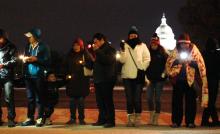
More than 100 Roman Catholic leaders are using this week’s annual march against legal abortion to press anti-abortion House members to pass immigration reform, saying they should see it as another “pro-life” issue.
“As brothers and sisters in faith, we urge these elected officials and all Catholics to defend the sanctity of human lives at all stages. We recognize the image of God in the migrant at the border, in the prisoner on death row, in the pregnant woman and in the hungry child,” the signers say in a letter sent Jan. 21 to two dozen Catholic members of the House of Representatives who are vocal abortion opponents.
The letter, organized by the Washington-based progressive advocacy group Faith in Public Life, is expected to be published as a full-page ad in Politico on Jan. 22.
That’s the day tens of thousands of demonstrators — including some of the House members the statement addresses — are expected to gather in Washington to protest the 1973 Supreme Court decision that legalized abortion, an annual display of passionate anti-abortion sentiment and political muscle.
The statement pointedly cites Pope Francis’ views that immigration woes and economic inequality are threats to life along with abortion, and it appears to be another example of the so-called Francis effect that is recasting the nation’s culture war by shifting the debates onto a broader terrain.
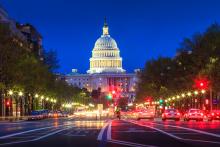
While a new Congress relentlessly pursued its ideological agenda to trim government and reward its big-money patrons, a vastly more complicated world intruded:
- In Maryland, a bishop reportedly driving drunk struck a bicyclist, fled the scene while he lay dying and, according to some reports, returned only after a church official told her she had to do so.
- In Paris, a handful of religious terrorists defended the Prophet Muhammad by slaughtering the staff of a satirical magazine.
- In Nigeria, the Islamic extremist group Boko Haram intensified its systematic massacring of Nigerian citizens.
- In New York City, police officers wanting more respect from the new mayor waged a childish campaign of disrespect against the mayor and against the people of New York.
- In Washington, the latest jobs report showed more jobs being created but no gains in pay. That means the lower and middle classes continue to be dragged down by up-with-wealth political actions.
All this in a week’s time, all while Congress was pursuing a stale ideological agenda dating back to the 1930s. In that agenda, legislators would gut Social Security (take that, FDR), reward big oil with a new pipeline (thanks for the patronage, Koch brothers), chip away at Affordable Care (gotcha, Barack) and appease social conservatives.
They would treat the world as a simple place where government must shrink, people must suffer and the precious few must get richer.
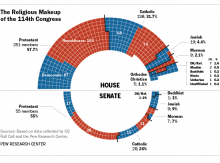
Republicans will take full control of Capitol Hill when the 114th Congress is sworn in on Jan. 6, but even with a political shift, there will be little change in the overall religious makeup of Congress, according to a new analysis from the Pew Research Center.
Here are seven ways the religious makeup of Congress will (and won’t) change.
1) More than nine-in-10 members of the House and Senate (92 precent) are Christian; about 57 percent are Protestant while 31 percent are Catholic. The new Congress will include at least seven members who are ordained ministers.
2) Protestants and Catholics continue to be over-represented as members of Congress than other Americans. As of 2013, 49 percent of American adults are Protestant, and 22 percent are Catholic, according to a new Pew Research Center analysis.
3) The biggest difference between Congress and other Americans is the number of people who say they are religiously unaffiliated. Just 0.2 percent of Congress say they are religiously unaffiliated, compared with 20 percent of the general public. In fact, the only member of Congress who publicly identifies herself as religiously unaffiliated is sophomore Rep. Kyrsten Sinema, D-Ariz.

In 2002, at a time when insurance providers were unwilling to provide coverage for losses resulting from acts of terrorism, and when construction and utility companies were stalling in their development projects, Congress passed the Terrorism Risk Insurance Act (TRIA). They decided to socialize some of the financial risk, giving a federal government guarantee on insurance payouts exceeding 100 million dollars.
Over the next 12 years, Presidents Bush and Obama and six different Congresses made countless decisions to increase the risk of terrorism (and of a bailout under TRIA). Of course, the most brutally profound effects of those decisions were imposed on children, women, and men in other parts of the world. Likely the least affected people were the ones complaining in the business sections of major papers last month.
They are worried because TRIA expired January 1. An unexpected fluke on the last day of the last congressional session is to blame. “Everybody expected this would get done,” fumed Manhattan developer Douglas Durst, to New York Times reporter Jonathan Weisman.
He won’t be waiting all that long — House Speaker John Boehner promised the Baltimore Sun to “act very quickly” to renew TRIA when Congress reconvenes.

Tonight, faith leaders and all those who have spent years trying to fix our broken immigration system should feel gratitude toward President Obama. In a primetime address to the nation, the president announced he was taking executive action to relieve some of the suffering caused by the failures of the status quo. Millions of families will no longer live under the daily threat of having their lives torn apart by senseless deportations, which is something all Christians – whether Republican or Democrat – should celebrate. Many of our brothers and sisters in Christ, who have spent significant portions of their lives hiding in the shadows, can now enjoy the flourishing God intends for us all. Their joy and well-being must inform our judgments of the president’s action, especially in light of the biblical call to “welcome the stranger.”
Unfortunately, the president’s compassionate actions are creating a political firestorm among some Republicans in Washington. Their anger and antipathy toward the White House are blinding them to the positive effects these measures will have for our society. Even after decades living and working in our nation’s capital, I’m still amazed at the many ways political ideology can prevent us from having “eyes that see” and “ears that hear.” I lament that our political discourse has come to this.
Everyone agrees the only way to find sustainable, long-term solutions is through Congress passing bipartisan legislation. The Senate did exactly that more than 500 days ago, but their honest efforts have languished in the House of Representatives because of Republican intransigence. GOP leaders promised alternative policy ideas; reform garnered widespread, nationwide support — including among a majority of Republicans; faith leaders were hopeful after countless positive conversations with members of Congress; the president even told me that he was “optimistic” about reform after conversations with Speaker John Boehner; the country, and, more importantly immigrant families, patiently waited — yet, the House failed to act.

I went to the town dump today, and I found it open, functioning, filled with people doing the right thing in the right way, giving useful advice to a novice, and able to drive in and out without mayhem, all under the watchful eye of a single employee.
Its no-nonsense efficiency reminded me of church suppers, where everything seems to work because people are helping, not managing. Imagine Congress being that capable.
I suppose we should be thankful that Congress scampered out of town for five weeks. If they’re going to do nothing, at least they should do nothing out where the constituents who elected them can take their measure.
I suppose we should also be thankful that July 2014 only had 31 days. Imagine a longer month for suicidal conflicts and epidemics.
We should be thankful, too, that the world’s three great religions — wealth, technology, and the Abrahamic faiths — are getting on people’s nerves. Irritation might lead us to expect better.